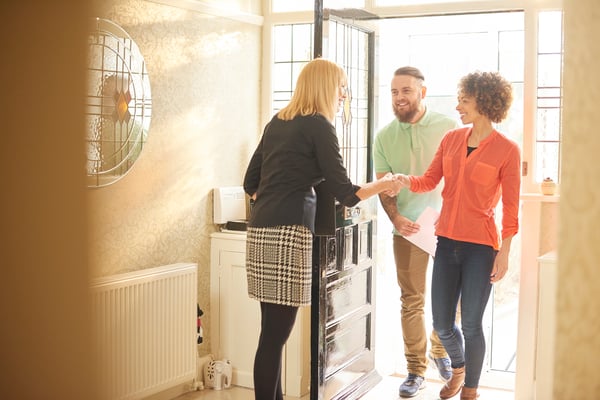First-time homebuyer tips: 6 steps to purchasing a new construction home
August 14th, 2023
By EYA Homes
August 14th, 2023
By EYA Homes
Purchasing a new construction home is an exciting process as you watch your dream home come to life. Whether buying a newly built home or resale, it is important to understand the steps in the process. Many of the steps in purchasing a new construction home are similar to purchasing a resale, such as signing a contract and securing a loan. However, since the home is new, there are a few additional steps to not only finalize the sale, but also to make the home your own such as selecting options and meeting with the builder for walk-throughs during various stages of the building process.
While the processes will vary by builder, below are 6 general steps of the purchasing process for new construction homes and what they mean.
Is new construction right for you?
Click here to find out

Once you have decided on which home/homesite to purchase, you will need to enter into a contract with the builder. Some builders may take lot hold reservations, while others may not and will go directly to the purchase agreement. The purchase agreement is often a long document so be sure to take the time to read it thoroughly before you sign. Once both parties have signed, it is then called a ratified contract, by which the builder and purchaser are now held accountable. A financial deposit is typically required at this stage. The deposit may be split into two: an earnest money deposit and an options deposit.

Before the contract is signed, you will either need to have pre-approval for a loan or show that you can cover the cost of the home with your current assets. Builders often have preferred lenders who they frequently work with, who understand the process and can provide competitive rates. Potential benefits of working with preferred lenders include possible closing cost benefits and better communication among all parties. An added benefit of purchasing a new construction home is that lenders may offer to lock in rates for longer terms. If interest rates are expected to go up over the coming months, your loan will be secure until your closing date months down the road.

For many, part of the enjoyment of buying a new home is selecting options and designing the home with your preferred choices of flooring, cabinets, countertops and more. As your home is being built, you will meet with the builder to select the options you would like in your home. This includes structural options (such as changing an open study to a bedroom or adding a rear deck) and finish options (such as color and type of cabinets and countertops).
While this can be very exciting for some, it can also be stressful for others as there are many decisions to be made. To help make this process less overwhelming, familiarize yourself with key terms (such as standard vs upgrade) and the selections process. Here are a few tips for selecting new home options:

Throughout the construction process, there should be a series of walk-throughs with the builder. These may include pre-construction, pre-drywall and pre-settlement. Take “inside the walls” pictures or video during your pre-drywall walk-through so you know where there is extra blocking, wiring, pipes, etc. for when you begin to hang TVs and artwork. Inspectors should visit the home in the pre-drywall stage so the pre-drywall walk-through is a good time to review the inspector’s report with the builder. The pre-settlement walk-through is similar to a final walk-through of a resale purchase and is your last opportunity to point out any potential issues before closing.
Find the perfect new, modern home for you

At last, your new home is ready and the final step is the closing process! Closing typically takes place at the office of a title company. The title company ensures the loan has been approved, all necessary paperwork is signed and the purchaser’s ownership is recorded. There are a number of items you will need in advance (such as an insurance policy, cashier’s check, etc) so be sure to come prepared with all the requested items.

One additional benefit of purchasing a new construction home is the warranty services. A walk-through is typically performed several months after closing to check in with the homeowner and address any issues. Although it will vary, typical builder warranties offer one to two years of coverage on materials and workmanship and up to 10 years on structural elements.
Do:
Don't:
Can I work with a Realtor when purchasing a new construction home?
Yes! Most builders do have purchasers who work with Realtors. When purchasing a resale home, it is typically the seller who pays the Realtor fees. It is similar when purchasing a new construction home, as the builder will typically pay the agreed upon Realtor fees. Be sure you know who will pay all associated fees upfront.
Realtors can be valuable sources of information regarding the reputation of the builder, home price comparisons and more. However, the builder sales representatives are also excellent resources who will have the in-depth knowledge of the local market, the homes, comparable pricing, etc. Whether or not you prefer to work with a Realtor will depend on your own preference. The key is to work with someone you trust and who has the experience, market knowledge and understanding of what you are looking for in a new home and neighborhood.
How do I know if I am financially ready to buy a home?
As you start to consider purchasing a home, it is important to understand if you are financially ready. Questions to ask yourself include: How is my credit? Do I have enough for a down payment? How do lenders assess my loan application?
Here are some helpful links to dive in to financially preparing to purchase a home.
Whether you're purchasing a new construction home for the first time, or for the first time in years, it's important to understand the process and make sure all your questions are answered.
For more guidance and tips on purchasing a new construction home, check out our comprehensive guide to new construction homes—complete with helpful resources, tips, and information to help you make the right decisions for you and your family.